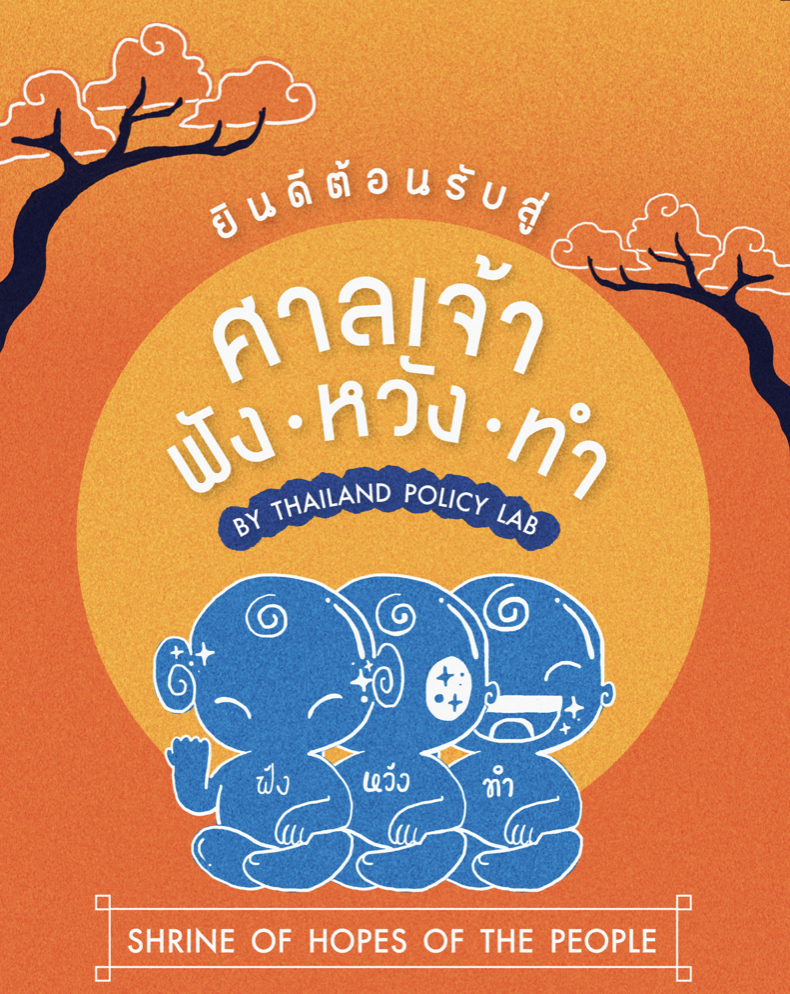[English below]
การเปลี่ยนแปลงทางประชากรของประเทศไทยมีสาเหตุมาจาก
การเกิด
- อัตราการเกิดลดลงเนื่องจากคนแต่งงานช้าลง ไม่ค่อยนิยมมีบุตร หรืออยู่เป็นโสดมากขึ้น
- อัตราการเกิดไม่พึงประสงค์ในกลุ่มวัยรุ่นยังอยู่ในระดับสูง ส่งผลต่อสุขภาพของเด็กที่เกิดมา และทำให้เกิดปัญหาต่อพ่อแม่วัยรุ่น ทั้งทางสังคม การเลี้ยงบุตร และโอกาสทางการศึกษา
การตาย
- คนมีอายุยืนยาวขึ้น เนื่องจากวิทยาการทางการแพทย์และสาธารณสุข
- ในขณะที่อัตราการตายก่อนวัยอันควรจากอุบัติเหตุ โรคไม่ติดต่อ และปัญหาด้านสุขภาพจิตอยู่ในระดับสูงขึ้น
การย้ายถิ่น
- ปี 2563 พบว่ามีคนไทยในต่างประเทศ 1.28 ล้านคน
- การย้ายถิ่นเพื่อหาโอกาสที่ดีกว่าในการทำงานและคุณภาพชีวิต
- แรงงานต่างชาติย้ายเข้ามาทำงานในไทยเพิ่มมากขึ้น
การเปลี่ยนแปลงทางประชากรที่เกิดขึ้นไม่ใช่เรื่องไกลตัว และส่งผลต่อคุณเองในหลายมิติ มาลองดูซิว่าคุณเองอาจจะเจอความเสี่ยงด้านไหนบ้าง
เสี่ยงแล้วนะ…ด้านสังคม
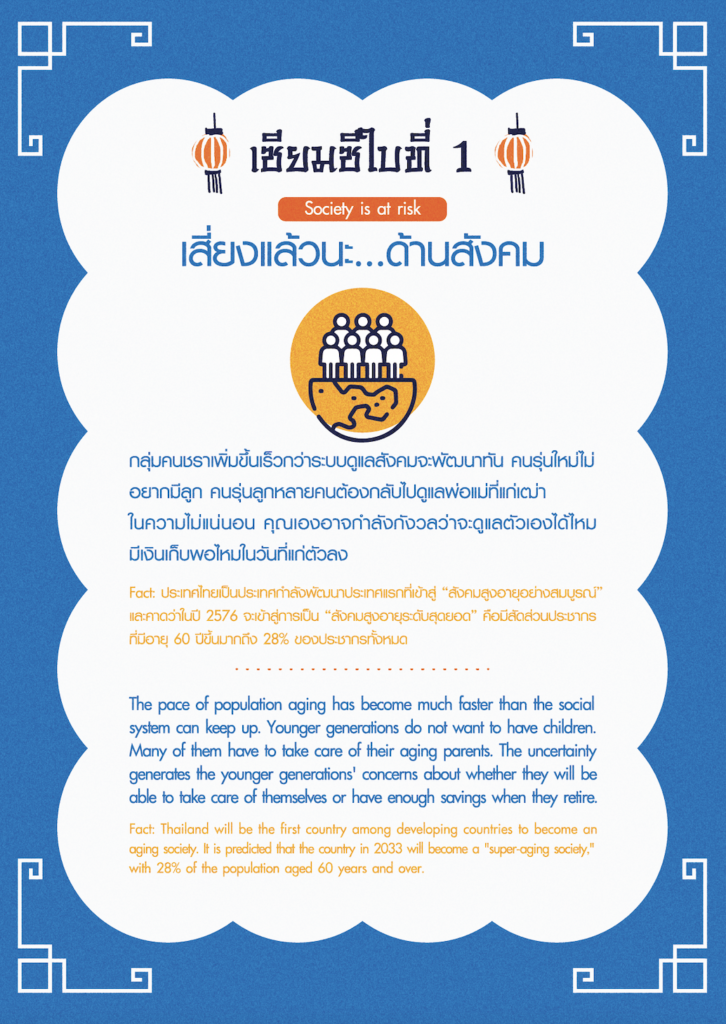
กลุ่มคนชราเพิ่มขึ้นเร็วกว่าระบบดูแลสังคมจะพัฒนาทัน คนรุ่นใหม่ไม่อยากมีลูก คนรุ่นลูกหลายคนต้องกลับไปดูแลพ่อแม่ที่แก่เฒ่า ในความไม่แน่นอน คุณเองอาจกำลังกังวลว่าจะดูแลตัวเองได้ไหม มีเงินเก็บพอไหมในวันที่แก่ตัวลง
Fact: ประเทศไทยเป็นประเทศกำลังพัฒนาประเทศแรกที่เข้าสู่ “สังคมสูงอายุอย่างสมบูรณ์” และคาดว่าในปี 2576 จะเข้าสู่การเป็น “สังคมสูงอายุระดับสุดยอด” คือมีสัดส่วนประชากรที่มีอายุ 60 ปีขึ้นมากถึง 28% ของประชากรทั้งหมด
เสี่ยงแล้วนะ…ด้านเศรษฐกิจ
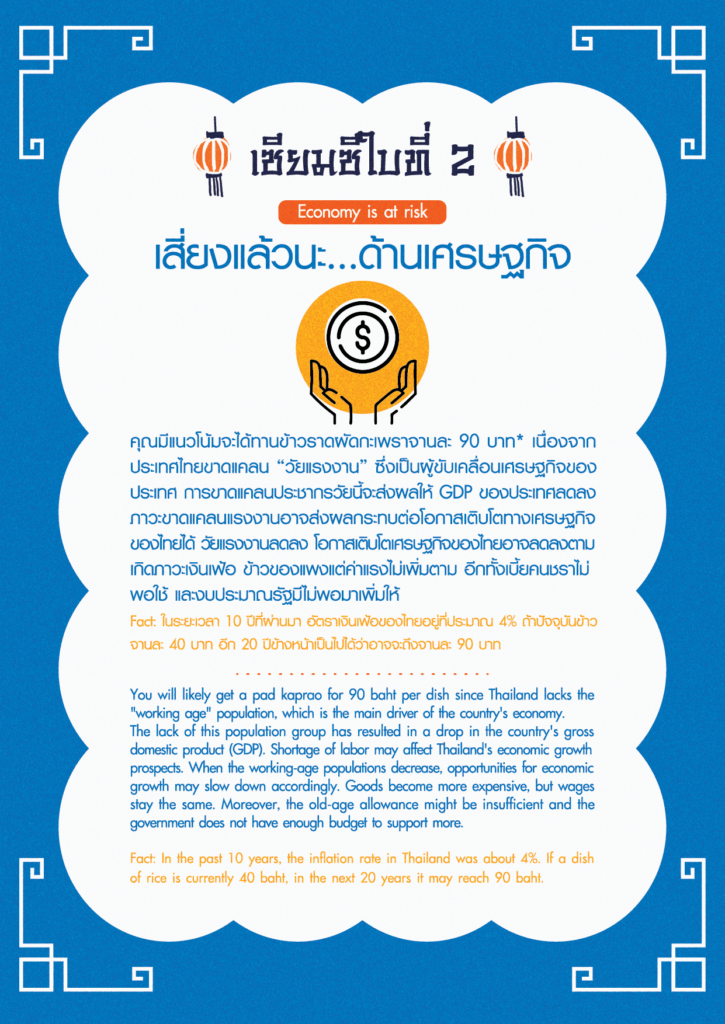
คุณมีแนวโน้มจะได้ทานข้าวราดผัดกะเพราจานละ 90 บาท* เนื่องจากประเทศไทยขาดแคลน “วัยแรงงาน” ซึ่งเป็นผู้ขับเคลื่อนเศรษฐกิจของประเทศ การขาดแคลนประชากรวัยนี้จะส่งผลให้ GDP ของประเทศลดลง ภาวะขาดแคลนแรงงานอาจส่งผลกระทบต่อโอกาสเติบโตทางเศรษฐกิจของไทยได้ วัยแรงงานลดลง โอกาสเติบโตเศรษฐกิจของไทยอาจลดลงตาม เกิดภาวะเงินเฟ้อ ข้าวของแพงแต่ค่าแรงไม่เพิ่มตาม
เพราะอีกทั้งเบี้ยคนชราไม่พอใช้ และงบประมาณรัฐมีไม่พอมาเพิ่มให้
Fact: ในระยะเวลา 10 ปีที่ผ่านมา อัตราเงินเฟ้อของไทยอยู่ที่ประมาณ 4% ถ้าปัจจุบันข้าวจานละ 40 บาท อีก 20 ปีข้างหน้าเป็นไปได้ว่าอาจจะถึงจานละ 90 บาท https://www.dop.go.th/th/know/15/926
เสี่ยงแล้วนะ…ด้านสิ่งแวดล้อม
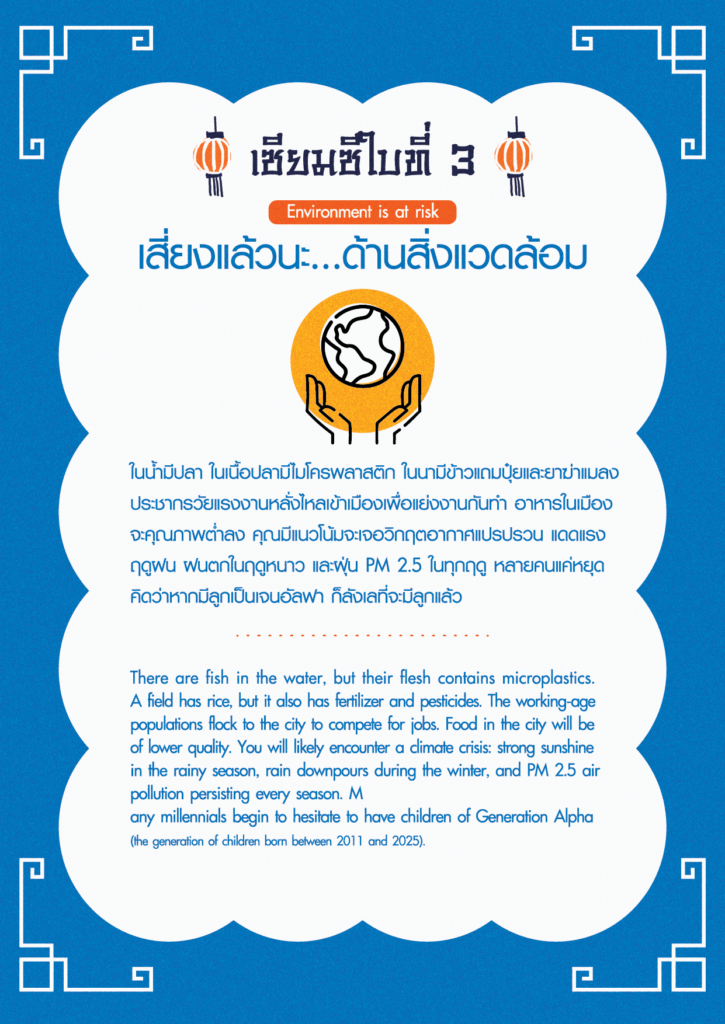
ในน้ำมีปลา ในเนื้อปลามีไมโครพลาสติก ในนามีข้าวแถมปุ๋ยและยาฆ่าแมลง ประชากรวัยแรงงานหลั่งไหลเข้าเมืองเพื่อแย่งงานกันทำ อาหารในเมืองจะคุณภาพต่ำลง คุณมีแนวโน้มจะเจอวิกฤตอากาศแปรปรวน แดดแรงฤดูฝน ฝนตกในฤดูหนาว และฝุ่น PM 2.5 ในทุกฤดู หลายคนแค่หยุดคิดว่าหากมีลูกเป็นเจนอัลฟา ก็ลังเลที่จะมีลูกแล้ว
เสี่ยงแล้วนะ…ด้านการศึกษา
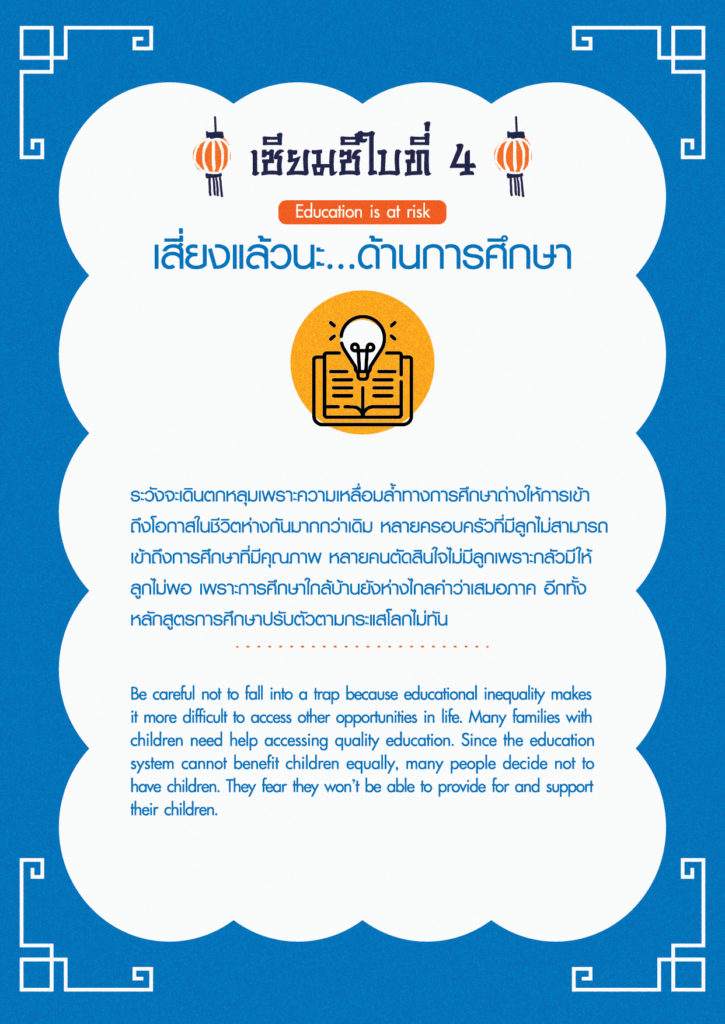
ระวังจะเดินตกหลุมเพราะความเหลื่อมล้ำทางการศึกษาถ่างให้การเข้าถึงโอกาสในชีวิตห่างกันมากกว่าเดิม หลายครอบครัวที่มีลูกไม่สามารถเข้าถึงการศึกษาที่มีคุณภาพ หลายคนตัดสินใจไม่มีลูกเพราะกลัวมีให้ลูกไม่พอ เพราะการศึกษาใกล้บ้านยังห่างไกลคำว่าเสมอภาค อีกทั้งหลักสูตรการศึกษาปรับตัวตามกระแสโลกไม่ทัน
เสี่ยงแล้วนะ…ด้านสาธารณสุข
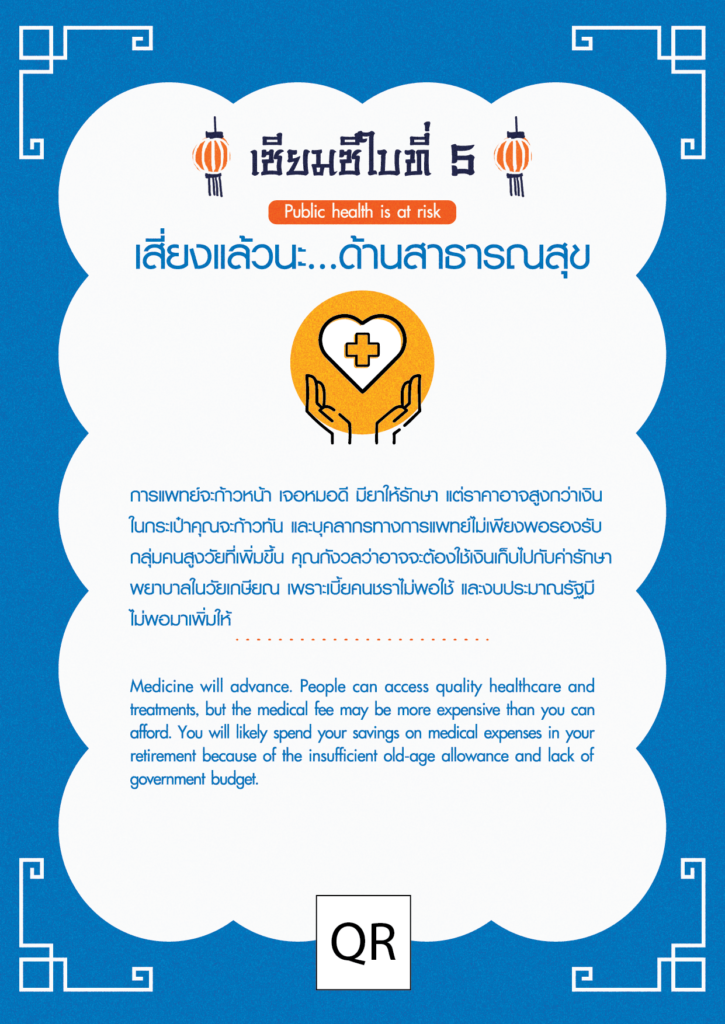
การแพทย์จะก้าวหน้า เจอหมอดี มียาให้รักษา แต่ราคาอาจสูงกว่าเงินในกระเป๋าคุณจะก้าวทัน และบุคลากรทางการแพทย์ไม่เพียงพอรองรับกลุ่มคนสูงวัยที่เพิ่มขึ้น คุณกังวลว่าอาจจะมีแนวโน้มจะต้องใช้เงินเก็บไปกับค่ารักษาพยาบาลในวัยเกษียณ และไหนจะปัญหาสุขภาพจิตรุมเร้าจากสภาพสังคมที่เร่งรัดบุคลากรทางการแพทย์ไม่เพียงพอรองรับกลุ่มคนสูงวัยที่เพิ่มขึ้นวัยเกษียณ เพราะเบี้ยคนชราไม่พอใช้ และงบประมาณรัฐมีไม่พอมาเพิ่มให้
==========
Thailand’s shifting demographics are caused by several problems:
Birth rates
- Birth rates drop since people get married later in life. Many couples do not actively plan to have children, while many prefer to stay single.
- Unwanted fertility rates among adolescents still remain high, adversely affecting the newborn’s health. Teen parents also face difficulties in parenting, education, and other social opportunities.
Mortality rates
- People tend to live longer due to advances in health science and modern medicines.
- However, premature mortality rates caused by accidents, non-communicable diseases, and mental health are higher than usual.
Migration
- In 2020, there were 1.28 million Thai people living abroad.
- Migration for better job opportunities and quality of life
- More migrant workers move to work in Thailand.
The demographic changes that have occurred are not far-fetched. It can affect you in many different ways. Let’s see what risks you may encounter.
Society is at risk
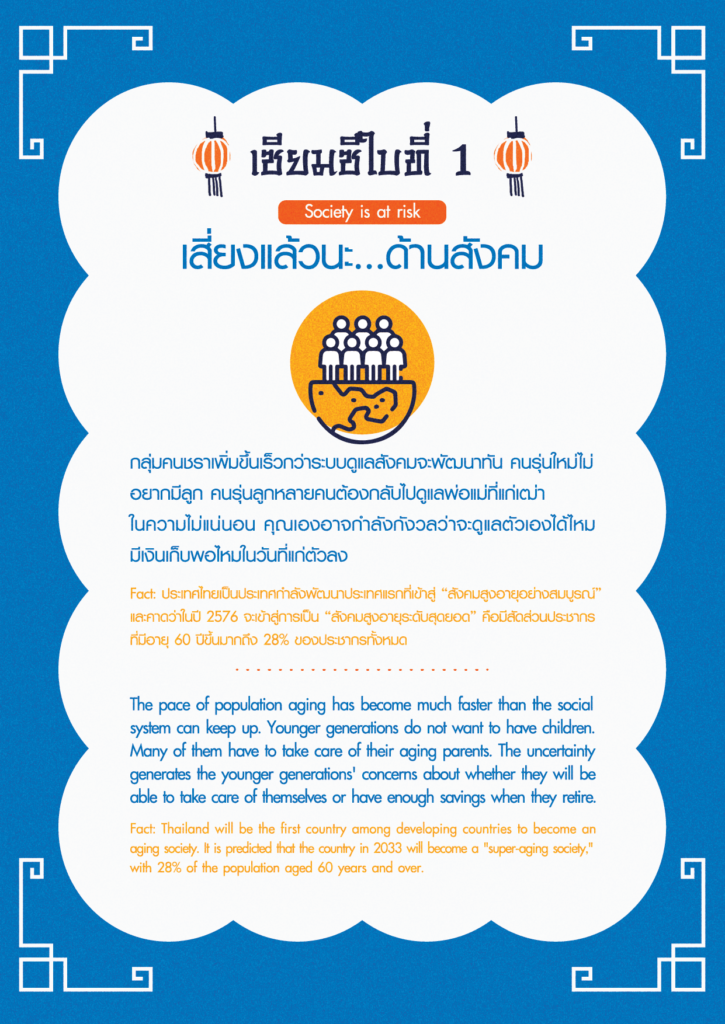
The pace of population aging has become much faster than the social system can keep up. Younger generations do not want to have children. Many of them have to take care of their aging parents. The uncertainty generates the younger generations’ concerns about whether they will be able to take care of themselves or have enough savings when they retire.
Fact: Thailand will be the first country among developing countries to become an aging society. It is predicted that the country in 2033 will become a “super-aging society,” with 28% of the population aged 60 years and over.
Economy is at risk

You will likely get a pad kaprao (Thai basil fried rice) for 90 baht per dish since Thailand lacks the “working age” population, which is the main driver of the country’s economy. The lack of this population group has resulted in a drop in the country’s gross domestic product (GDP). Shortage of labor may affect Thailand’s economic growth prospects. When the working-age populations decrease, opportunities for economic growth may slow down accordingly. Goods become more expensive, but wages stay the same. Moreover, the old-age allowance might be insufficient, and the government needs more budget to support them financially.
You will likely spend your savings on medical expenses in your retirement because of the insufficient old-age allowance and lack of government budget.
Fact: In the past 10 years, the inflation rate in Thailand was about 4%. If a dish of rice is currently 40 baht, in the next 20 years it may reach 90 baht.
Environment is at risk

There are fish in the water, but their flesh contains microplastics. A field has rice, but it also has fertilizer and pesticides. The working-age populations flock to the city to compete for jobs. Food in the city will be of lower quality. You will likely encounter a climate crisis: strong sunshine in the rainy season, rain downpours during the winter, and PM 2.5 air pollution persisting every season. Many millennials begin to hesitate to have children of Generation Alpha (the generation of children born between 2011 and 2025).
Education is at risk

Be careful not to fall into a trap because educational inequality makes it more difficult to access other opportunities in life. Many families with children need help accessing quality education. Since the education system cannot benefit children equally, many people decide not to have children. They fear they won’t be able to provide for and support their children. Moreover, the curriculum needs to be developed and evolve with the contemporary world.
Public health is at risk

Medicine will advance. People can access quality healthcare and treatments, but the medical fee may be more expensive than you can afford. The healthcare workers will not be enough to help care for an increasing number of senior citizens. You become concerned about your savings that you may need to use on medical expenses in your retirement. Then, there are also people’s mental health problems that are deteriorating due to the fast-paced society.
